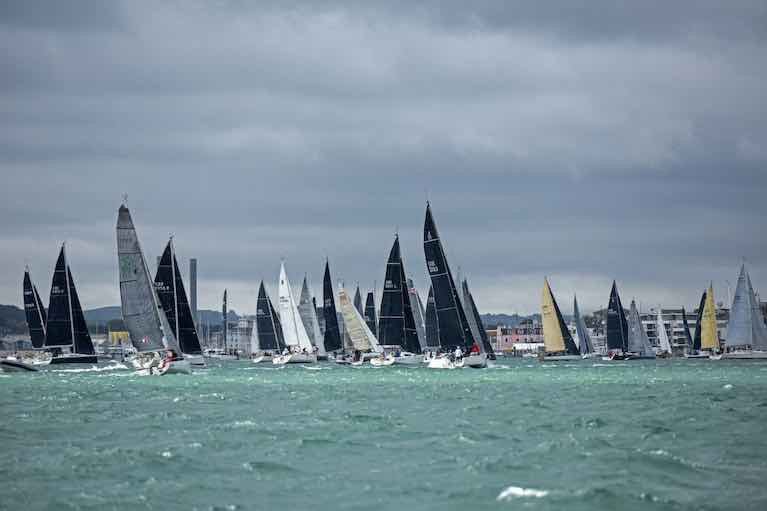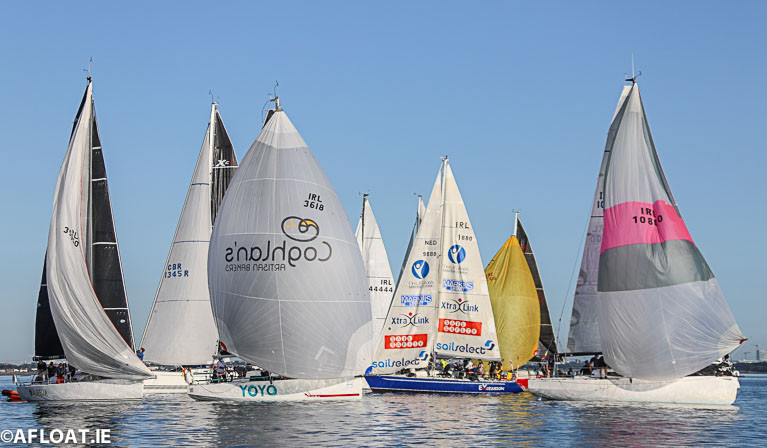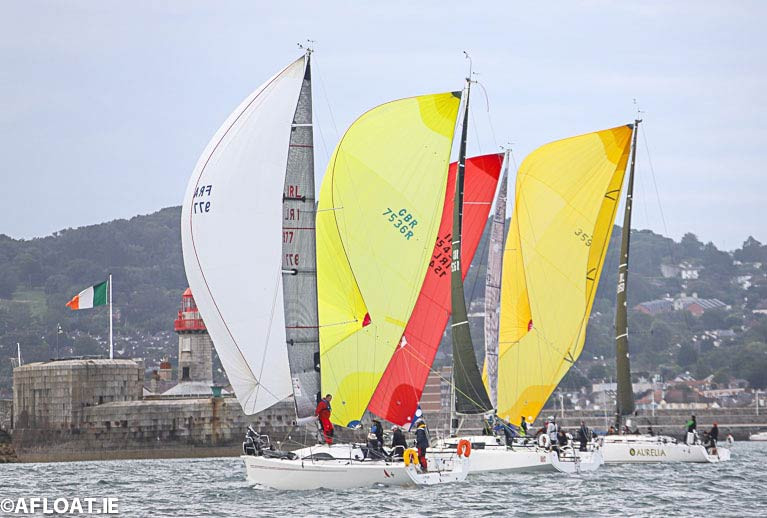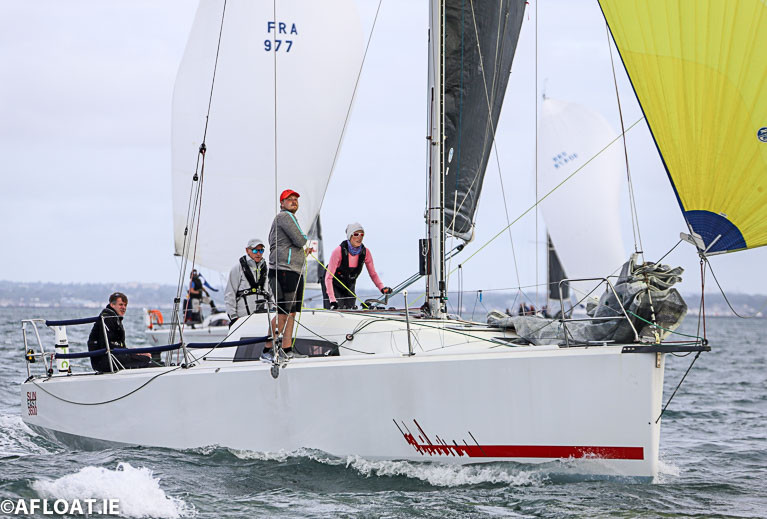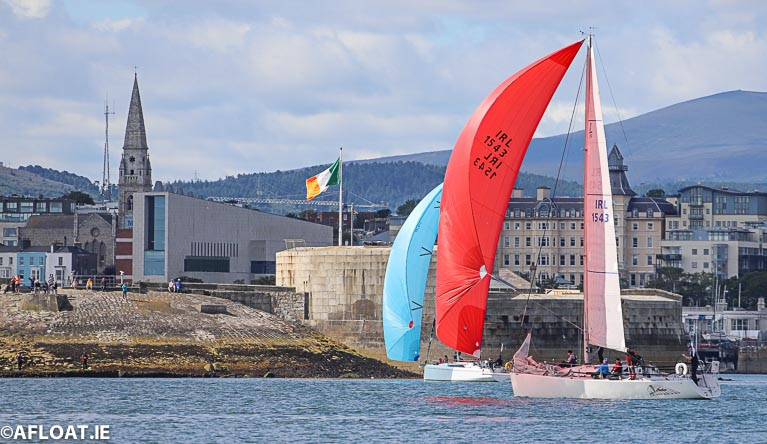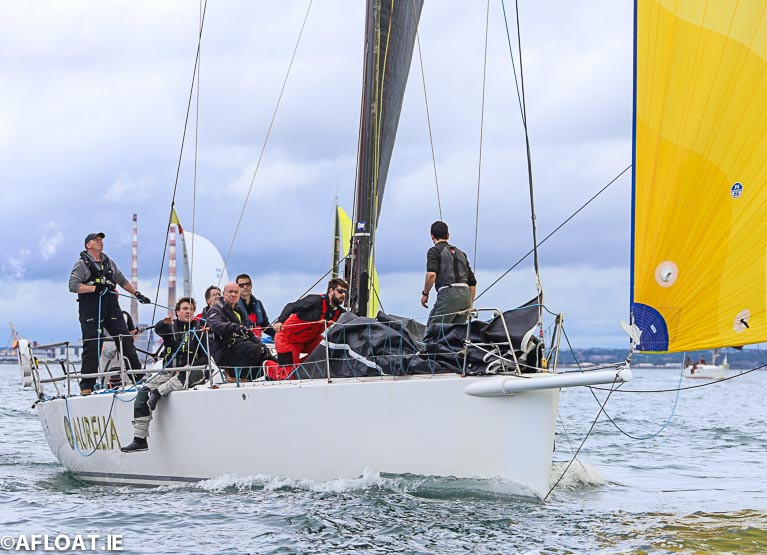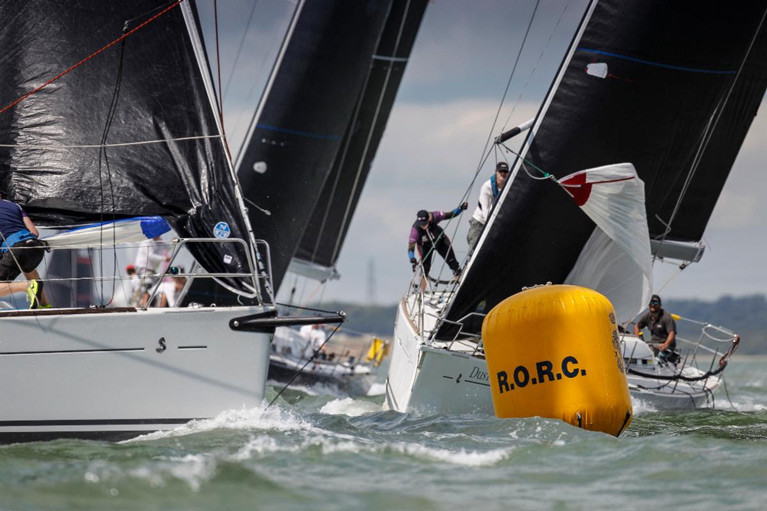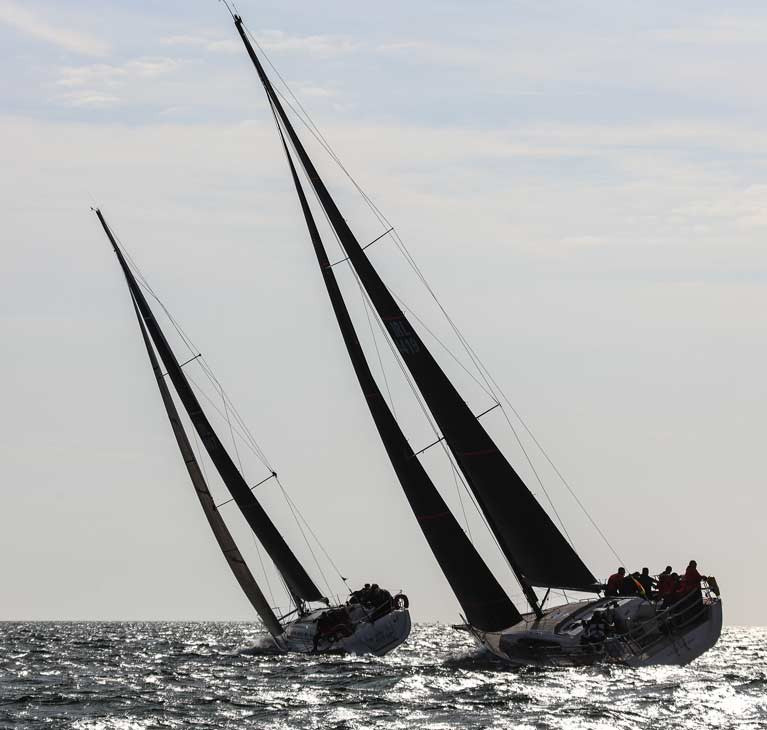Displaying items by tag: Offshore
RORC Cancels Season’s Points Championship
For the first time in the history of the London club, the RORC Season’s Points Championship has had to be cancelled. Current restrictions continue to make it impossible to run overnight races for all IRC classes with the result that the last offshore race of the season, the Cherbourg Race has had to be cancelled. With only two races, the RORC Transatlantic Race and the RORC Caribbean 600 having been completed, and three required to constitute a series, the club has had no option but to cancel the 2020 Season’s Points Championship.
“This has been a difficult and unprecedented decision for the club,” said RORC Commodore Steven Anderson. “We were very keen to have one proper offshore race for all classes to allow us to complete the series. We all hoped that by September the restrictions to control the spread of the virus would have been eased sufficiently to allow a sprint to Cherbourg and a good way to end a very frustrating season for all.”
RORC Two-Handed Race to Cherbourg
Instead of the usual season ending Cherbourg Race, the RORC has confirmed the intention to run a two-handed race to Cherbourg. This race which will start on Friday 4th September is in line with current government regulation and has added significance in that the City of Cherbourg will host the finish of the Rolex Fastnet Race for the 2021 and 2023 editions.
RORC Racing Manager Chris Stone has been delighted with the number of teams who are participating in the summer series.
“We were pleased to have 133 boats in ‘Race the Wight’, the first race of our Summer Series and interest in the rest of the series is very strong. We decided to start the two-handed race to Cherbourg on the Friday to give the opportunity for those two-handed teams who are involved in the summer series to participate in the last race of the series which is scheduled for Sunday 6th September.”
The RORC Summer Series consists of three additional races on Saturday 15th August, Saturday 22nd August and Sunday 6th September.
For the second week running, a smaller class two boat has won one of ISORA’s long offshore races in tricky light winds off the Dublin coast.
After a 15-hour marathon, the Grzegorz Kalinecki skippered First 310 More Mischief sailed into Dun Laoghaire Harbour to finish last night in darkness as the Class Two and overall IRC winner two in the 15-boat fleet.
Provisional results via ISORA's Yellowbrick tracker put two-class boats in the top three overall after the long race in light northerly breezes that took the fleet from Dublin Bay to North Dublin before a long reach to County Wicklow. The full course at 8 am was from Dun Laoghaire Harbour to a virtual mark to Bennett Bank to Rockabill to East Kish to Breeches, Muglins and a finish in dusk or total darkness at Dun Laoghaire Harbour. a total of 7o nautical miles.
 (Above and below) With just seconds to the start of ISORA's Race 5a off Dun Laoghaire Harbour, Rockabill VI and the Sunfast 3600 YoYo look for the advantage at the Committee boat end of the start line
(Above and below) With just seconds to the start of ISORA's Race 5a off Dun Laoghaire Harbour, Rockabill VI and the Sunfast 3600 YoYo look for the advantage at the Committee boat end of the start line




Kalinecki's 30-footer took some big scalps including the reigning champion Rockabill VI (Paul O’Higgins) that again made an impressive start to yesterday’s fifth race of the season and was the Class Zero winner. Last weekend in a fifty miler, Rockabill VI also showed impressive form only to be beaten by the A31 A Plus when the wind died and smaller boats caught up over the race four-course, as Afloat reported here.
 Gently does it! Even a loudly spoken sentence seems to threaten the collapse of spinnakers in the light north wind. J109 Indian (Red) leads Samaton (Pink) and White Mischief (Black)
Gently does it! Even a loudly spoken sentence seems to threaten the collapse of spinnakers in the light north wind. J109 Indian (Red) leads Samaton (Pink) and White Mischief (Black)
 Shortly after the start, the 15-boat fleet head for the first virtual mark on the 70-mile course Photo: Afloat
Shortly after the start, the 15-boat fleet head for the first virtual mark on the 70-mile course Photo: Afloat
 The overall winner, the Grzegorz Kalinecki skippered First 310 More Mischief (black spinnaker) makes her way out of Dublin Bay Photo: Afloat
The overall winner, the Grzegorz Kalinecki skippered First 310 More Mischief (black spinnaker) makes her way out of Dublin Bay Photo: Afloat
The Line Honours winner in an elapsed time of 13h 33m 6s was Chris Power Smith’s Aurelia from the Royal St. George Yacht Club. Third on class Zero was early season performer, George Sisk’s XP44, WOW.
 George Sisk's WOW and John O'Gorman's Hot Cookie Photo: Afloat
George Sisk's WOW and John O'Gorman's Hot Cookie Photo: Afloat
Sailing fully crewed as opposed to two-handed for the first time this season, Andrew Algeo’s J 99 Juggerknot II was second overall and the IRC One winner. Second in Class One was the Simon Knowles skippered Howth J109, Indian. Third in class was a new arrival in ISORA racing, the John Harrington skippered IMX 38 Excession.
 Andrew Algeo's Juggerknot II from the Royal Irish Yacht Club was second overall and sailing fully crewed for Race 5
Andrew Algeo's Juggerknot II from the Royal Irish Yacht Club was second overall and sailing fully crewed for Race 5
Second to Kalinecki’s More Mischief in Class Two was Desert Star, the Ronan O’Siochru Irish Offshore Sailing School’s Sunfast 37 that also finished third overall, in another coup for class Two. Third in Class Two was Steve Hayes’ First 34.7, Magic Touch.
 Line honours winner Chris Power Smith's J122 Aurelia, included ISORA Chairman Peter Ryan (second from right) on the crew for Race five Photo: Afloat
Line honours winner Chris Power Smith's J122 Aurelia, included ISORA Chairman Peter Ryan (second from right) on the crew for Race five Photo: Afloat
This is the first race of the 2020 season since news broke that racing for ISORA's overall Wolf’s Head Trophy would be scrapped this season following the abandonment of cross channel racing.
 Ronan O’Siochru Irish Offshore Sailing School’s Sunfast 37 Photo: Afloat
Ronan O’Siochru Irish Offshore Sailing School’s Sunfast 37 Photo: Afloat
A new offshore race has been announced, the Fastnet 450 from Dublin to Cork on August 22nd, the same date as the cancelled Round Ireland Race. The new fixture is attracting some strong entries including some ISORA regulars including Algeo's J/99 and the Kalinecki Polish-based crew too.
In a major change to ISORA's rebooted season, the offshore body is cancelling plans for any further attempt at cross channel racing this season.
It is the latest blow for Irish Sea offshore sailing fans and follows the loss of this month's Round Ireland Yacht Race.
In view of the COVID situation in UK and Ireland and the present regulations in force, a meeting of ISORA's Sailing Committee unanimously decided that there will be no cross channel races and instead there will be races on each side of the Irish Sea. In view of this, the Wolf’s Head Series is being abandoned for 2020, ISORA Chairman Peter Ryan told Afloat.
'This was a very difficult decision for ISORA where the Wolf's Head trophy has been presented every year since it was first presented to ISORA in 1977 but the safety of all competitors is our primary concern and we are of course guided by the rules and regulations of the separate Nations, Ryan said.
Competitors will compete for the respective championship titles on either side of the Channel, the Coastal Series, Class Results and the Silver Class.
 ISORA's Wolf's Head Trophy - racing abandoned for ISORA's Top award for the first time in 43 years Photo: GPPhoto/ISORA
ISORA's Wolf's Head Trophy - racing abandoned for ISORA's Top award for the first time in 43 years Photo: GPPhoto/ISORA
Should the situation improve significantly later this month, resulting in a relaxation of the regulations, the last race, the James Eadie, may proceed as planned from Pwhelli to Dun Laoghaire.
On Saturday, ISORA ran two separate offshore races on either side of the Irish Sea in a bid to keep the offshore scene alive in spite of the pandemic.
The revised schedule will be published shortly with the appropriate amendments and revised Supplemental Sailing Instructions.
Cork offshore sailing body SCORA has announced a new race that it says will be run in association with Dun Laoghaire Harbour's National Yacht Club and the Royal Cork Yacht Club. The 'pop-up' race is from Dun Laoghaire to Cork Harbour via the Fastnet Rock.
The IRC race will start in Dun Laoghaire on Saturday, August 22 which would have been the date of the Round Ireland Race start.
It will pass the Muglin, Tusker, Conningbeg and Fastnet lighthouses to Starboard before returning to Cork Harbour and passing the Cork Buoy to Port, finishing when Roches’s Point bears due East.
 National Yacht Club - celebrating 150th anniversary in 2020
National Yacht Club - celebrating 150th anniversary in 2020
The course is specifically designed to be of sufficient length to qualify skippers and crew for the RORC Fastnet Race 2021.
The clubs have combined forces to mark their anniversary celebrations, it being the 150th anniversary of the National Yacht Club and 300th (Tricentenary) of the Royal Cork Yacht Club.
Competing boats are invited to take part in the Tricentenary At Home Regatta of the Royal Cork Yacht Club which sees racing for IRC classes from the 28th – 30th August and will be one of the highlights of the club's celebrations.
The race will be governed by the COVID-19 guidelines as laid out by Irish Sailing and organising clubs.
Interested parties are asked to complete an expression of interest form here and a Notice of Race will be available in the coming days.
First for ISORA as Offshore Fleet Races Separately in Wales & Ireland for Wolf's Head Trophy
In a first-ever for ISORA, there will be two separate offshore qualifying races for its overall Wolfs Head Trophy this Saturday, one in Ireland and one in Wales.
The change arises from differences in COVID-19 regulations on either side of the Irish Sea. It's something of a bravo move by ISORA chiefs aiming to keep channel racing going in a week that has already seen the Round Ireland Race, the highlight of the offshore calendar, fall victim to the pandemic.
28 boats are entered so far for the first offshore of the season over a course size of 55-miles, nearly double the length of recent coastal races.
ISORA's top prize for the famous Wolf's Head is decided over the best of five races but this must include three qualifying offshore races. These races are long offshore courses and traditionally cross channel.
Unfortunately, though, differences in crew number limitations, port access and difficulties with overnight stays onboard have all conspired to make it impossible to run a qualifying race which is equitable and equally available to all competitors.
The result is that Saturday's racing will be scored taking account of the respective fleet sizes in both races.
Given ISORA entries currently show only two Welsh boats entered, it looks like it will be a small race in Wales and a larger race from Dublin Bay.
 ISORA's Wolf's Head Trophy for overall honours racing offshore in the Irish Sea Photo: GP Photo
ISORA's Wolf's Head Trophy for overall honours racing offshore in the Irish Sea Photo: GP Photo
ISORA racing in these difficult times has only been possible because of the association's investment in technologies which allow remote desk-top race management and as ISORA's Stephen Tudor told Afloat, [the association is] "Making the best of difficult times to get sailors on the water both sides of the Irish Sea!"
Saturday's race four consequently is a 55 miler, weighted 1.1. In Ireland, it will be a Dun Laoghaire offshore and back to Dun Laoghaire and in Wales from Pwllheli to Pwllheli. The course will be published by 1200hrs on Friday, 31st July. The forecast for Dublin Bay indicates more light westerlies that have been a feature of ISORA's 2020 Viking Marine Coastal Series thus far.
The dominant form of the 2019 Irish yacht of the year, Paul O'Higgins' JPK10.80 Rockabill VI continues to stalk the ISORA racecourse, picking up another win at 1.30 am this morning off Dun Laoghaire Harbour in the well attended night race, according to provisional results via the ISORA Yellowbrick tracker.
The 25-boat race was the third in the ISORA 2020 Re-Boot series and the third race of the Viking Marine sponsored Coastal Series of four.
The fleet started off Dun Laoghaire outfall buoy at 8 pm (the same as race one and two) and headed south to the Muglins and onto Breeches just north of Wicklow before heading back up the Dublin coast and a finish off Dun Laoghaire Pier heads.
 Rockabill VI Paul O'Higgins' JPK10.80 was the overall winner of the ISORA night race
Rockabill VI Paul O'Higgins' JPK10.80 was the overall winner of the ISORA night race
Aurelia was line honours winner
Chris and Patanne Smith's J122 Aurelia from the Royal St George Yacht Club was the line honours winner but dropped to second overall on corrected time over the 32-mile course sailed in light south and south-west winds.
Third overall was the National Yacht Club's First 40.7 Tsunami (Vincent Farrell) in a clean sweep for Class Zero boats.
 Vincent Farrell's First 40.7 Tsunami from the National Yacht Club
Vincent Farrell's First 40.7 Tsunami from the National Yacht Club
J99 wins IRC One
In IRC Class One, Andrew Algeo's J/99 took the gun from the J/109 Mojito with Prima Luce, third.
 Patrick Burke's Prima Luce was third in IRC One
Patrick Burke's Prima Luce was third in IRC One
Black Velvet Takes IRC Two win
Leslie Parnell's Beneteau 34.7 Black Velvet from the Royal Irish Yacht Club was the Class Two winner from Greystones Harbour JOD 35 entry Red Alert. Third was Humdinger.
Green Light for Wind & Solar Technologies & Community Energy as Ireland Receives EU Approval for Renewable Electricity Support Scheme
The Minister for Communications, Climate Action and Environment, Eamon Ryan T.D. today (20th July 2020), announced that Ireland has received State aid approval from the European Union to operate a new Renewable Electricity Support Scheme (RESS) out to 2025.
Minister Ryan said:
“As the Minister for Climate Action, I am delighted to welcome this announcement today from the EU Commission. It endorses the Government’s commitment to the Green Deal and launches a renewable energy revolution in Ireland. The RESS will provide us with a platform for rapid deployment of onshore and offshore wind and solar projects at scale and at least cost, replacing fossil fuels on our energy grid. It also offers communities the opportunity to produce their own power and share in the ownership of Ireland’s energy revolution.”
“As stated in the Programme for Government, Our Shared Future, we have committed to an average 7% per annum reduction in overall greenhouse gas emissions from 2021 to 2030 (a 51% reduction over the decade) and to achieving net-zero emissions by 2050. The RESS is one of the flagship measures that will assist Ireland on its way to achieving this target”.
The RESS will play an integral part of the progression to the ambitious 70% renewable electricity target by 2030 set out in the Programme for Government and to Ireland’s contribution towards an EU-wide renewable energy target of 32% by 2030, within a competitive auction-based, cost-effective framework.
Key features:
- The Renewable Electricity Support Scheme (RESS) is a competitive auction-based scheme which invites renewable electricity projects to bid for capacity and receive a guaranteed price for the electricity they generate for a maximum of 16 years.
- The RESS will operate for a 5 year period out to 2025 (with an option to extend subject to evaluation) with a series of auctions planned, depending on the pipeline of renewable electricity projects. This will provide pathways for renewable developers including offshore wind projects. The scheme will set out the indicative timelines and volumes for auctions over the coming period and provide clarity for developers in relation to when they need to have their projects 'auction ready'.
- The RESS is being rolled out with the cooperation of both the Commission of Regulation of Utilities (CRU) and EirGrid. EirGrid will implement and operate the auctions with CRU providing competition advice as well as auditing and monitoring the auction process.
Increasing Diversity of Renewable technologies. The Scheme is open to a range of renewable technologies that will broaden the renewable energy mix and enhance security of supply including solar and offshore wind. - Preference categories: RESS includes the use of preference categories to enable technology diversity. The first RESS auction (RESS 1) includes a specific solar category, which would represent approximately 10% of the overall auction.
- Community-led category: RESS includes the use of preference categories for community projects. RESS-1 includes a specific community category of up to 30 GWh. This will allow communities to develop their own renewable energy projects and sell the energy back to the grid
Community Participation: The Programme for Government, "Our Shared Future", recognises the importance of community involvement in energy projects. Communities have been designed into RESS. The first RESS auction includes mandatory community benefit funds for all projects and a dedicated community projects category. Additional community policies and supports are included in the State Aid; financial support for community-led projects, mandatory community benefit funds, investment opportunities for communities and citizens, and additional community categories for future RESS auctions. - The scheme will also include an EU state aid evaluation during the five year period to examine and evaluate the intended objectives of the scheme.
In conclusion Minister Ryan added,
“To date, onshore wind energy has been the most cost-effective technology available to Ireland, however to drive on and meet our renewable energy ambitions, other technologies such as solar and offshore wind will play a critical role in diversifying our renewable generation portfolio for the period out to 2030.”
RORC Cancels Overnight Offshore Race to Ushant
After a long and open discussion by the RORC Race Management team, senior members of the RORC Committee, and with advice from medical experts, it has been decided that any overnight race that the Club would run would not adhere to the UK Government guidance currently in place. As a result, the Ushant race has been cancelled and in its place will be organised a long day race in the English Channel using laid and virtual marks, starting and finishing in Cowes.
"It was a difficult decision as we were all keen to run a proper offshore race," said RORC Racing Manager Chris Stone. "The crux of the decision was based around the guidance that overnight stays away from home are permitted, but only with others from the same or one other household. So whilst a group of up to six people from different households can meet outside, and therefore race a boat (subject to social distancing), they cannot stay together overnight. Our medical expert also pointed out that it would be impossible to honour the 1m+ social distancing guidance when down below in all but the largest race boats."
"The RORC has to take a responsible position when organising offshore races and although teams are in the open air where transfer of the virus is dramatically reduced, we had to consider the position while below decks and the current Government guidance on staying away from home overnight," said RORC Commodore Steven Anderson. "The decision only affects the Ushant race and we will consider the options for the Cherbourg race (Friday September 4th) at the end of July."
RORC Mini Series
The RORC will now put in place a series of long day races which will include the 'Race the Wight' on Saturday August 1st, a round the cans day race in the Channel on Saturday 15th August and another long day race on Saturday 22nd August, with the Cherbourg race (or its replacement, on Saturday September 5th) and trophies awarded to each class winner, the Two Handed division and overall.
Race the Wight
Given that Government guidance now allows up to six people from different households to race on the same boat, the RORC Race Management team have also reviewed the eligibility criteria for the forthcoming Race the Wight, scheduled for the 1st August. There is no change to the Two Handed division, but the number of crew on any boat will be limited to six in total, or two thirds of the IRC crew number (rounded down), whichever is the least, with a minimum of three people.
RORC Racing Manager Chris Stone notes: "With the changes in regulations we believe that adopting the maximum crew of six people or two thirds of the boats IRC crew number (rounded down) is a fair solution for all the fleet and allows the smaller boats a greater opportunity to observe social distancing guidelines."
ISORA Launch Crew Manager Safety & COVID Tracking App
A new ISORA app has been developed by the offshore sailing body to register competing crews before each race.
The 2020 ISORA season got underway last Saturday with a 35-mile Viking Marine sponsored coastal race from Dun Laoghaire Harbour and was won by the Royal Irish's WOW (George Sisk) as Afloat reported here.
The 'ISORA Crewmanager App' logs crew names and mobile phone numbers as well as shore contact names and phone numbers.
Skippers are required by ISORA's Sailing Instructions to register all crew using the app that the association says will only be used for:
- for safety purposes and in an instance of an emergency.
- if required in association with the ISORA COVID Protocol and Contact Tracing
The App is available for Apple and Android phones.
ISORA has made good on its promise to publish its 'Back to Boating' Protocol this week (downloadable below), the offshore racing body is eager to get back racing at the earliest possible opportunity on the Irish Sea.
The first race will be on July 4th and it will be a coastal race of 35 miles duration. The revised programme (below) has in excess of 300 miles of racing for Round Ireland Race qualification purposes with two races of 75 miles each and a night race too.
The ISORA programme is also tying in with other major key sailing events such as an August 14th race as part of the Welsh IRC Championships, an August 29th race as part of Greystones Harbour Regatta off County Wicklow and a September 12th Lambay Race off Howth as part of WAVE Regatta.

The ISORA documents (downloadable below) are live working documents and the intention of the Race Management team is to update it as and when restrictions are relaxed/changed in the various territorial waters relevant to each race.


























